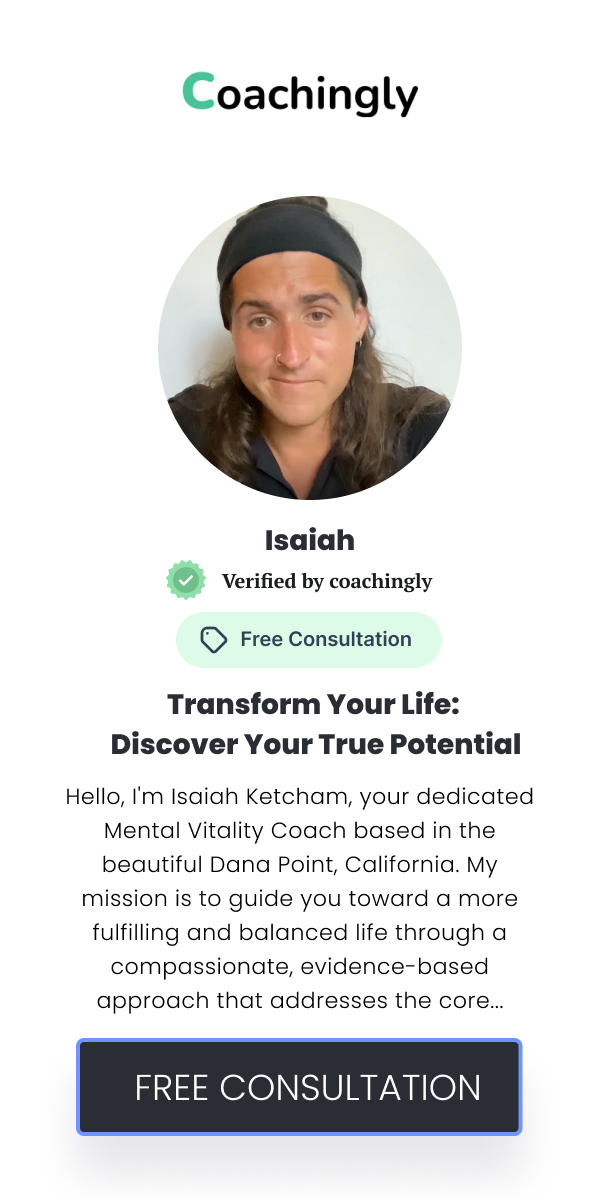
Empower Your Journey: How Coaching Supports Personal Growth and Fulfillment
Isaiah Ketcham
![]() August 25, 2024
August 25, 2024
Coaching, often misunderstood, is a collaborative process designed to unlock an individual's potential and foster personal growth. It revolves around guiding clients to achieve their personal and professional goals through structured conversations and actionable strategies. The essence of coaching lies in its forward-focused approach, helping clients envision their desired future and create a pathway to reach it. Unlike therapy, which often delves into past issues and healing, coaching emphasizes future possibilities and actionable steps. Mentoring, while also supportive, typically involves advice from someone with more experience in a specific field, whereas coaching is more about facilitating self-discovery and growth. Core coaching principles include a commitment to the client's agenda, the belief in their ability to achieve their goals, and creating a supportive, non-judgmental environment. This approach ensures that clients are empowered to make meaningful changes in their lives, based on their values and aspirations. Coaching plays a pivotal role in personal development by assisting individuals in identifying and clarifying their goals and aspirations. The process starts with understanding what is truly important to the client, helping them set clear and achievable objectives. These goals are often broken down into manageable milestones, making the path to success more tangible and less overwhelming. Through this structured approach, clients can tackle limiting beliefs and self-sabotaging behaviors that may have previously held them back. The transformative power of coaching lies in its ability to foster a proactive mindset, where challenges are seen as opportunities for growth rather than insurmountable obstacles. By continually focusing on progress and adapting strategies, coaching ensures that personal development remains dynamic and responsive to evolving needs. This way, individuals are not only setting goals but also building a resilient framework to support ongoing growth. The enhancement of emotional and mental well-being is a fundamental benefit of coaching. Techniques employed in coaching can significantly improve self-awareness and emotional intelligence, allowing individuals to better understand their feelings and reactions. This increased self-awareness is crucial for managing stress and building resilience, as it enables individuals to identify stressors and develop effective coping strategies. Coaching also provides tools for boosting self-esteem and confidence, which are essential for navigating both personal and professional challenges. By addressing the root causes of emotional struggles, coaching fosters a more balanced and positive outlook. The supportive nature of coaching helps clients navigate through difficult emotions, leading to improved mental clarity and emotional stability. As a result, clients experience a more harmonious and fulfilling approach to life, driven by a greater understanding of themselves. Effective coaching extends its benefits to improving relationships and communication skills. By enhancing interpersonal skills, coaching helps individuals navigate social interactions with greater ease and understanding. It supports the development of conflict resolution skills, allowing individuals to address and resolve disputes constructively. Strengthening both personal and professional relationships becomes a focus, as clients learn to set healthy boundaries and communicate more effectively. Coaching encourages reflective listening and empathetic responses, which are vital for fostering deeper connections with others. These enhanced communication skills not only improve relationships but also contribute to more effective teamwork and collaboration in professional settings. By investing in relationship-building skills, coaching creates a ripple effect, improving overall social and professional dynamics. Coaching is instrumental in achieving holistic health and balanced living, integrating various aspects of well-being into the personal growth journey. It begins with setting health and wellness goals that complement an individual's broader life objectives. The coaching process encourages clients to prioritize their physical health, recognizing the integral link between physical wellness and overall life satisfaction. Time management and prioritization are key components of this holistic approach, helping clients balance their personal and professional responsibilities effectively. By aligning personal values with life goals, coaching supports a more integrated and fulfilling lifestyle. This balanced approach fosters a sense of achievement and contentment, as clients are not only reaching their goals but also enhancing their overall quality of life. The holistic perspective ensures that personal development is sustainable and aligned with long-term well-being. Finding the right coach is a critical step in the journey toward personal growth and fulfillment. I'd like you to know that essential qualities to look for include experience, relevant credentials, and a coaching style that resonates with your needs. It's important to assess how well a potential coach's approach aligns with your personal goals and values. Compatibility and fit are crucial, as a successful coaching relationship depends on mutual understanding and trust. Setting clear expectations from the outset helps to establish a productive and effective coaching relationship. Exploring various coaching options and having initial consultations can provide valuable insights into how different coaches operate. This process ensures that you select a coach who not only meets your needs but also inspires and motivates you to achieve your goals. Achieving Long-Term Growth and Sustained Fulfillment Long-term growth and sustained fulfillment are the ultimate objectives of the coaching journey. Developing sustainable habits and practices is essential for maintaining progress and achieving lasting change. Coaching helps clients set realistic goals and continuously measure their progress, making necessary adjustments to stay on track. This iterative process ensures that personal development remains aligned with evolving aspirations and circumstances. Emphasizing ongoing learning and adaptation fosters a mindset of continuous improvement, contributing to sustained personal and professional growth. By integrating coaching insights into daily routines, clients build a foundation for long-term success and fulfillment. This approach not only supports immediate goals but also fosters a lifelong commitment to personal development and well-being.Understanding Coaching and Its Core Principles
The Role of Coaching in Personal Development
How Coaching Enhances Emotional and Mental Well-Being
The Impact of Coaching on Relationships and Communication
Coaching for Holistic Health and Balanced Living
The Process of Finding the Right Coach

Recent Articles
The Path to a Fulfilling Life: Combining Mental Health and Holistic Wellness Strategies
Mental health and holistic wel...
![]() Sep 06, 2024
Sep 06, 2024
Overcoming Negative Core Beliefs: Shifting Your Mindset for Lasting Change
Negative core beliefs are deep...
![]() Sep 05, 2024
Sep 05, 2024
Mental Vitality and Emotional Balance: A Comprehensive Approach to Wellness
The Importance of Mental Vital...
![]() Sep 04, 2024
Sep 04, 2024
Navigating Life Transitions: A Guide to Mental and Emotional Resilience
Understanding Life Transitions...
![]() Sep 03, 2024
Sep 03, 2024
The Power of Positive Change: Breaking Free from Self-Sabotaging Behaviors
Understanding Self-Sabotaging ...
![]() Sep 02, 2024
Sep 02, 2024
Life After Divorce: Steps to Rebuild and Flourish in Your New Chapter
Divorce often signifies a prof...
![]() Sep 01, 2024
Sep 01, 2024
Navigating Relationship Challenges: How Coaching Can Help Couples Communicate Effectively
Understanding the Importance o...
![]() Aug 31, 2024
Aug 31, 2024
Couples Coaching for Lasting Love: Rebuilding Trust and Intimacy in Relationships
Understanding the Role of Coup...
![]() Aug 30, 2024
Aug 30, 2024
From Stress to Success: Managing Anxiety with Holistic Wellness Practices
Understanding Anxiety and Its ...
![]() Aug 29, 2024
Aug 29, 2024
The Role of Core Beliefs in Mental Health: Identifying and Overcoming Limiting Patterns
Understanding Core BeliefsCore...
![]() Aug 28, 2024
Aug 28, 2024
Restoring Balance: How Holistic Coaching Supports Your Mental, Physical, and Emotional Well-being
In today's fast-paced world, a...
![]() Aug 27, 2024
Aug 27, 2024
The 90-Day Human Resilience Intensive: Your Path to Emotional and Physical Well-being
Understanding the 90-Day Human...
![]() Aug 26, 2024
Aug 26, 2024
Creating Healthy Boundaries: How to Protect Your Mental Health in Relationships
Understanding Healthy Boundari...
![]() Aug 24, 2024
Aug 24, 2024
Achieving Mental Clarity: The Connection Between Wellness and Emotional Health
Understanding Mental ClarityMe...
![]() Aug 23, 2024
Aug 23, 2024
Transformative Success Stories: Real Lives Changed by Holistic Coaching
Holistic coaching represents a...
![]() Aug 21, 2024
Aug 21, 2024
Holistic Health 101: Integrating Mental, Emotional, and Physical Wellness for a Balanced Life
Understanding Holistic HealthH...
![]() Aug 20, 2024
Aug 20, 2024
How Accountability in Coaching Drives Sustainable Personal Growth
Understanding Accountability i...
![]() Aug 19, 2024
Aug 19, 2024
Transforming Relationships: Tools to Strengthen Communication and Connection
Understanding the Importance o...
![]() Aug 18, 2024
Aug 18, 2024
Healing from the Past: How to Overcome Emotional Wounds and Build a Better Future
Understanding Emotional Wounds...
![]() Aug 17, 2024
Aug 17, 2024
Rediscovering Yourself: How to Rebuild Confidence and Self-Worth Post-Divorce
Embracing the Journey of Self-...
![]() Aug 16, 2024
Aug 16, 2024
Breaking Free from Toxic Relationships: A Holistic Approach to Healing and Growth
Understanding Toxic Relationsh...
![]() Aug 15, 2024
Aug 15, 2024
Rebuilding After a Toxic Divorce: Steps to Reclaim Your Life and Thrive
Acknowledging the Impact of a ...
![]() Aug 14, 2024
Aug 14, 2024
Unlocking Your Potential: How Holistic Wellness Coaching Can Transform Your Life
Understanding Holistic Wellnes...
![]() Aug 13, 2024
Aug 13, 2024
